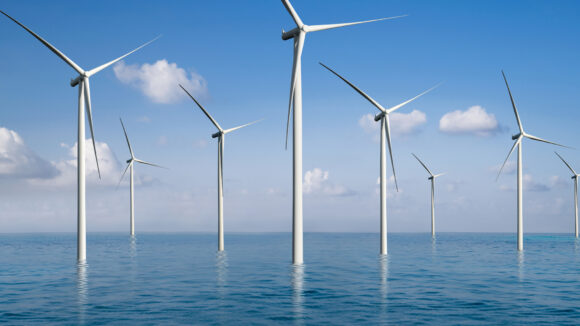
Turbines in an off shore wind farm. Shutterstock
This September, Gov. Phil Murphy signed an order to increase New Jersey’s offshore wind goal to nearly 50 percent by 2040.
A group of 12 Rutgers students is hard at work to help the state meet that deadline.
They are part of the inaugural cohort of the Wind Institute Fellowship Program: a pilot launched last April at Rutgers and several other state institutions by the New Jersey Economic Development Authority (NJEDA). This group of undergraduate and graduate researchers from across the state were hand-picked by their respective faculty to address the needs of the state’s burgeoning offshore wind industry while building its future workforce. The inaugural cohort fellows will present their research findings at the First Annual New Jersey Wind Research Symposium on April 14.
“This fellowship is addressing something that’s happening in real time,” said Chelsie Riche, assistant director of Student Success and Experiential Education with the Office of the Executive Vice President for Academic Affairs, who oversaw the fellowship’s design and implementation at Rutgers.
“This is a chance for students to gain real world professional experiences and a faculty mentor for life in their field,” said Riche, adding the NJEDA’s Wind Institute awarded Rutgers $282,000 to fund stipends for its first round of 12 fellows.
In exchange, New Jersey gets the best and brightest working in tandem to help reduce the state’s carbon footprint and combat climate change, said NJEDA vice president of Offshore Wind, Jen Becker.
“As they embark on their careers, these fellows will help New Jersey build a robust and diverse talent pipeline to meet the needs of our growing offshore wind industry,” Becker said.
The fellowship, which NJEDA recently extended through the 2024-2025 academic year, taps into Rutgers’ strengths as a research and land grant institution, said Prabhas Moghe, executive vice president for Academic Affairs. The interdisciplinary collaboration across a dozen departments and three campus allows the fellows to focus on all facets of the wind industry – from engineering and economics to ecology, sociology and policy.
“Science is part of it, of course, designing the turbines, figuring out the physics and how it impacts the life of oceanic creatures,” said Moghe. “But there is another part to it. How does this translate for humans? What does this mean for communities in close proximity to these turbines? This approach will give us a wholistic picture of what using off-shore wind means.”
Among the first in the Wind Institute Fellowship Program are future engineers, marine biologists, sociologists, policy makers and Diversity, Equity and Inclusion (DEI) experts, including Rutgers-New Brunswick senior Andrei Dumitriu, who is studying for a bachelor’s degree in electrical engineering.
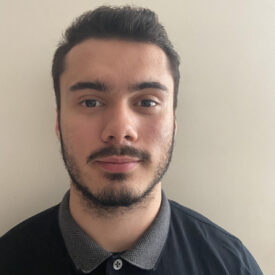
Rutgers-New Brunswick senior Andrei Dumitriu is studying for a bachelor’s degree in electrical engineering. Courtesy of Rutgers Wind Institute Fellowship.
Dumitriu’s past internships piqued his curiosity in renewable energy markets, but said he had difficulty finding relevant core classes in the up-and-coming industry. He was considering creating a student club to help him connect with industry professionals – until he received an email last spring about the new fellowship program.
“I already had an internship set up for summer, but I jumped at this opportunity also. This fellowship was exactly what I was looking for,” he said
A self-described “numbers guy,” who loves working with spreadsheets, Dumitriu spent his summer internships using production cost models and power flow simulators to improve assumptions about the economic sustainability of storing and using off-shore wind, solar and hyrdo as a primary source of energy.
“Wind is not like coal or gas. It is not a dispatchable resource. You can’t simply turn on the wind on demand,” said Dumitriu. “You have to build better energy storage units and figure out what we can do to capture that wind and use it when we need it at a later date. We are on the forefront of completely optimizing wind generation the transmission grid and energy market. This is the chance to be a pioneer in something new.”
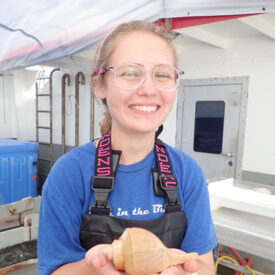
Sophia Piper is a first-year doctoral student in the Rutgers Ecology and Evolution Program. Courtesy of Rutgers Wind Institute Fellowship
Sophia Piper, a first-year doctoral student in the Rutgers Ecology and Evolution Program working at the Rutgers Haskin Shellfish Research Lab, is studying how the infrastructure associated with offshore wind farms will affect marine benthic infaunal communities – or as she puts it “little critters in the dirt and sand.”
“We don’t know much about what happens at the bottom of the ocean when you put wind turbines in,” said Piper, whose research focuses on the ecological impact of artificial reefs created by aquatic life that fix themselves to turbine bases anchored to the ocean floor.
“Mussels and barnacles stumble across the bases, settle there and attract other animals, creating this awesome reef habit that will benefit cobia and black bass,” she said. “But this isn’t great for other aquatic life like clams that live in the soft sediment and compete with mussels for the same space and food. We don’t know much this interaction, but that commercial clammers are concerned about this issue.”
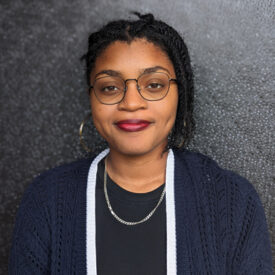
Danielle Antoine is a Rutgers-New Brunswick senior in the School of Engineering. Courtesy of Rutgers Wind Institute Fellowship
Danielle Antoine, a Rutgers-New Brunswick senior in the School of Engineering who is majoring in Environmental Engineering with a minor in Mathematics, spent her internship using data to build models that project how off-shore turbines’ power outputs could be affected by different wind speeds, directions and other environmental parameters.
Though her area of study is based in engineering and data analysis, Antoine said she found herself equally fascinated by public policy discussions surrounding off-shore wind – something she’s been exposed to during her fellowship through networking events.
“During a mock town hall, we talked about issues I never thought of – how the turbines can affect fishing and nearby communities,” she said. “It really brought up the sort of problems this could create and explored how can we prevent them from negatively impacting the people who are supposed to be benefiting from these solutions.”
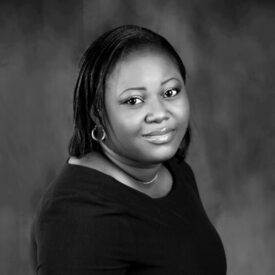
Tolulope (Tolu) Omodara is a first-year masters/doctoral student in Public Affairs and Community Development at Rutgers-Camden. Courtesy of Rutgers Wind Institute Fellowship
Once the engineering, economics and ecological aspects of off-shore wind are aligned, the state will need a trained workforce to power the industry. Tolulope (Tolu) Omodara is working to meet that need, exploring ways to introduce diverse students to the field early on so they will be ready to take on leadership roles in the future.
“We need to stop educating based on a child’s zip code,” said Omorada, a first-year masters/doctoral student in Public Affairs and Community Development at Rutgers-Camden. “Without sufficient education and equitable education, the best of policies will remain on paper. To remain competitive in this industry and stave off the widespread destruction predicted to come with climate change, we need leadership with diversity of thought capable of forward thinking.”
This article originally appeared in Rutgers Today.

